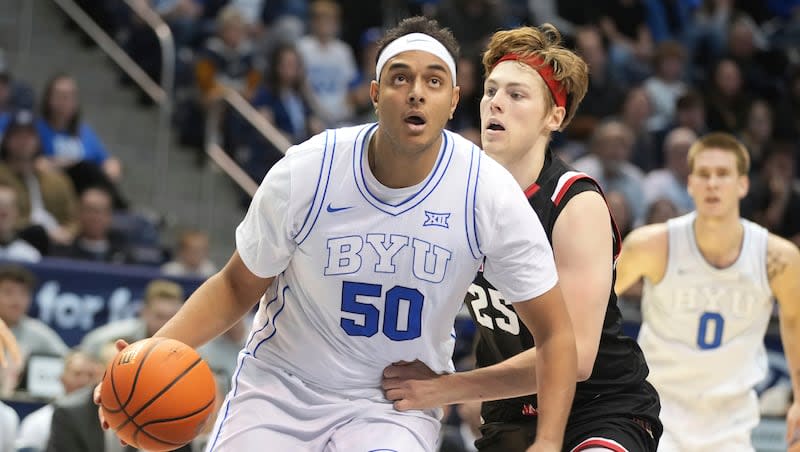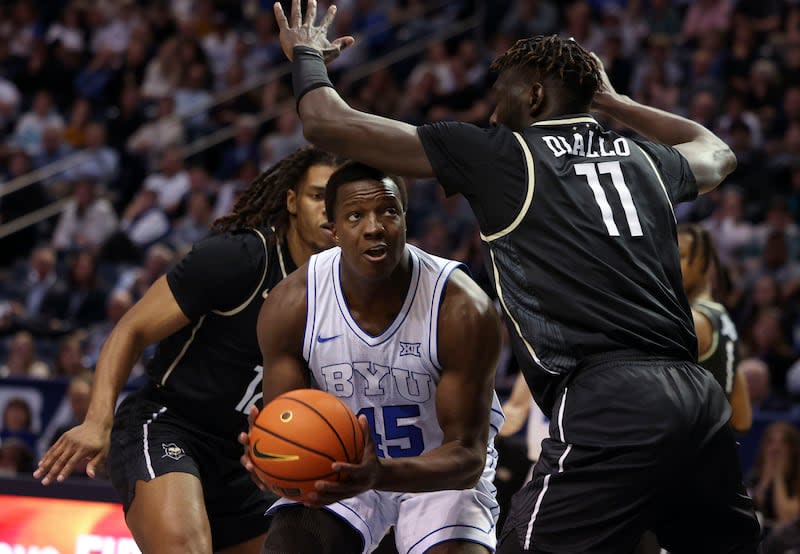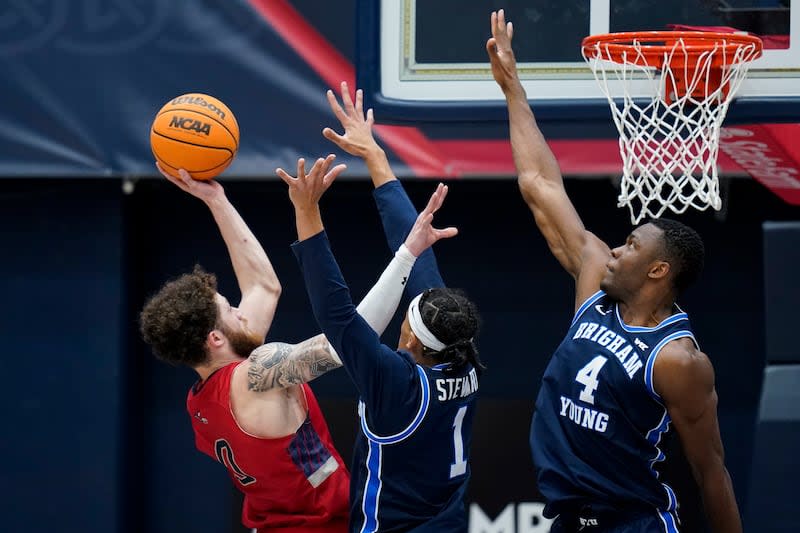Three BYU players are Muslim. Here’s how the Islamic holy month of Ramadan will affect their routines

Wednesday night’s heartbreaking 68-63 loss to No. 6 Iowa State in Ames, Iowa, means that BYU’s men’s basketball team is no longer in the running for a top-four seed, and the double-bye that comes with it, in the Big 12 tournament next week at Kansas City’s T-Mobile Center.
Heading into Saturday’s regular-season finale, BYU (9-8, 21-9) is tied for sixth place in the Big 12 standings. But if the No. 20 Cougars beat Oklahoma State Saturday night in Provo and Kansas (10-7, 22-8) loses at No. 1 Houston, BYU would get the fifth seed in Kansas City.
The fifth-seeded team will play its second-round game next Wednesday at 11:30 a.m. local time in Missouri. The timing of tipoff — in daylight hours — is significant to the three members of the team who are Muslim: post players Aly Khalifa, Fousseyni Traore and Atiki Ally Atiki.
That’s because Ramadan, the Islamic holy month when most Muslims fast daily, going without food and water from sunrise to sunset, begins on Sunday evening and runs through April 9.
Khalifa told the Deseret News last month that he plans to take part in the fast and will stop eating food and drinking water at approximately 6 a.m. each day during Ramadan.
“So if the tournament games are in the middle of the day, that is going to be pretty tough,” said Khalifa, who is from Alexandria, Egypt. “But I want to do it. I told (BYU head athletic trainer Rob Ramos) and others that I am doing it. I feel like I have the power in me to play games while fasting.”
BYU basketball spokesperson Tyson Jex confirmed that Khalifa will fast throughout Ramadan, while Traore and Atiki will observe the holy month in other ways; they are not planning on fasting. Traore lists his hometown as Bamako, Mali, and Atiki is from Mwanza, Tanzania.
Khalifa said he met with BYU basketball staffers Ramos, Michael “Wiz” Davie (director of strength and conditioning and sports science), an athletic department nutritionist and coach Mark Pope weeks ago to make a plan for Ramadan. The entire department has vowed to make it work, he said.

Khalifa said it wasn’t an issue last year when he played for Charlotte because Ramadan didn’t start until March 22. The timing of Ramadan changes each year because the Islamic calendar is based on the moon.
By March 22, 2023, the 49ers’ season had concluded. Khalifa said when he played in Egypt, a country with a much higher percentage of Muslims, no games were played in daylight hours during Ramadan.
“The hydration part is going to be tricky,” Khalifa said. “I have never experienced it in America, so it is obviously going to be a real challenge. But I feel like we have the right supporting staff to help me get through it. It is just going to be tricky if we have a 3 p.m. game and I can’t eat or drink and the last time I ate was 5 in the morning.”
Khalifa averages 5.8 points and 4.0 rebounds per game, but is most known for being one of the best passers in the country. The 6-11 junior has 105 assists, and just 29 turnovers, this season.
He certainly won’t be the first or only Muslim basketball player in conference tournaments and the NCAA’s Big Dance balancing his athletic and religious routines.
Last year, Ramadan began on March 22 and ran through April 20, and eventual national champion UConn featured three Muslim players observing Ramadan, including star player Adama Sanogo. They weren’t able to eat until midway through UConn’s Elite Eight game against Gonzaga, which the Huskies won, 82-54.
Sanogo told CT Insider at the time that the support staff prepared peanut butter and jelly sandwiches, as well as fruit, that was easily digestible and could be eaten at halftime.
“It is not a question for me. I have to do it. It is fun. I am really excited to do it while playing games and I know for a fact I will play really well,” Khalifa said. “Just the hydration part of it will be questionable. That’s why we have Wiz. He’s from the NBA and he has done it with a lot of players. … If it is a night game I should be OK.”
Davie worked for the NBA’s Milwaukee Bucks from 2015 to 2023 and was hired by BYU last August. He declined to be interviewed for this article, saying it has been “a team effort.”
Steven Fink, a professor of religious studies at University of Wisconsin-Eau Claire, wrote a book entitled “Dribbling for Dawah: Sports Among Muslim-Americans” in 2016. He was initially “surprised” to learn that BYU — owned, operated and supported by The Church of Jesus Christ of Latter-day Saints — has three Muslims on its basketball team.
“Just treat (Khalifa) with great respect and give him all the resources or space needed to be able to observe his religion,” is Fink’s advice to BYU and its fans.
Fink, who is not Muslim, said high-profile Muslim athletes such as NBA centers Kareem Abdul-Jabbar, Hakeem Olajuwon and Enes Kanter, a former Utah Jazz player, have handled Ramadan differently and that it is a very personal matter that shouldn’t be judged, criticized or questioned.
“Abdul-Jabbar, when Ramadan coincided with the NBA season, he chose not to fast, just because he felt like he couldn’t play at his desired level, and he felt like he would be letting down his teammates and his fans,” Fink said. “So he would compensate by reading extra chapters of the Quran, the holy book of Islam.”
Fink said Olajuwon did fast when the Houston Rockets’ games coincided with Ramadan.
“His (scoring) average actually went up. He scored more. He attributed it to God giving him extra power and concentration and strength,” Fink said.
The professor noted that the 2012 Summer Olympics in London ran from July 27 to Aug. 12 and coincided with Ramadan. Several Muslim athletes handled it differently, illustrating the “variety and flexibility” among Muslims and their Ramadan practices.
Kanter, who changed his name to Enes Kanter Freedom, made a day-in-the-life video five years ago to show what his day is like during Ramadan. When nightfall comes, the former Jazzman eats dates, which are a staple food during Ramadan and provide a burst of energy.


